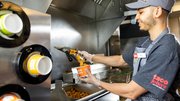Article
Now trending: Restaurants will continue to make 'cage-free egg' pledges in 2016
Restaurants serving cage-free eggs turned out to be one of this year’s top trends, and it will also be a popular move in the coming year.

January 4, 2016
It seems a variety of restaurants are following in the footsteps of Panera, Taco Bell, McDonald’s and Starbucks when it comes to a new dedication to serving cage-free eggs. The practice turned out to be one of this year’s top trends, and I’m willing to bet even more restaurants will make similar announcements in the coming year.
Einstein Noah Restaurant Group, Peet’s Coffee, and Caribou Coffee, for example, announced this month that cage-free policies will be complete by 2020, according to the Humane Society. Also, Flowers Foods — one of the country's largest baked goods companies and owner Tastykake brand — announced it's also switching to exclusively cage-free eggs by 2025.
Vishy Visweswaran of SCA Technologies predicts consumer demand for cage-free eggs will force more restaurants to abandon caged-egg sources.
"As other brands follow the lead of McDonald's and Taco Bell, which have pledged to go cage-free over a period of years, the supply chain impact will be significant," he said. "There is insufficient built-up capacity for cage-free eggs in the industry. This will only get worse if we see more bird flu outbreaks like the one from earlier this year."
Who will pay the price for cage free?
Migrating to cage-free eggs requires significant investments in new cage-free systems, according to Visweswaran, who said producers who sell in California have a head start, but in other regions, the infrastructure in not in place.
"Moving to cage-free systems will also likely increase mortality rates for the hens, further reducing capacity, and therefore supply," he said.
While consumers have been willing to pay more at the grocery store for cage-free eggs, it is less likely they will accept large price increases at restaurants.
"For the short term, this means lower margins for restaurants, and possibly their suppliers," Visweswaran said. "This puts pressure on restaurants to make up that margin loss elsewhere in the supply chain."
To help cope over the short term, Visweswaran said, operators must have strong contingency plans if they are to ensure supply to their restaurants.
When it comes to longer-term strategies, he said chains should work collaboratively with suppliers on a win-win model, where they "share in the short-term investments as well as the benefits from the halo effect of moving to cage-free eggs."
 ChatGPT
ChatGPT Grok
Grok Perplexity
Perplexity Claude
Claude








